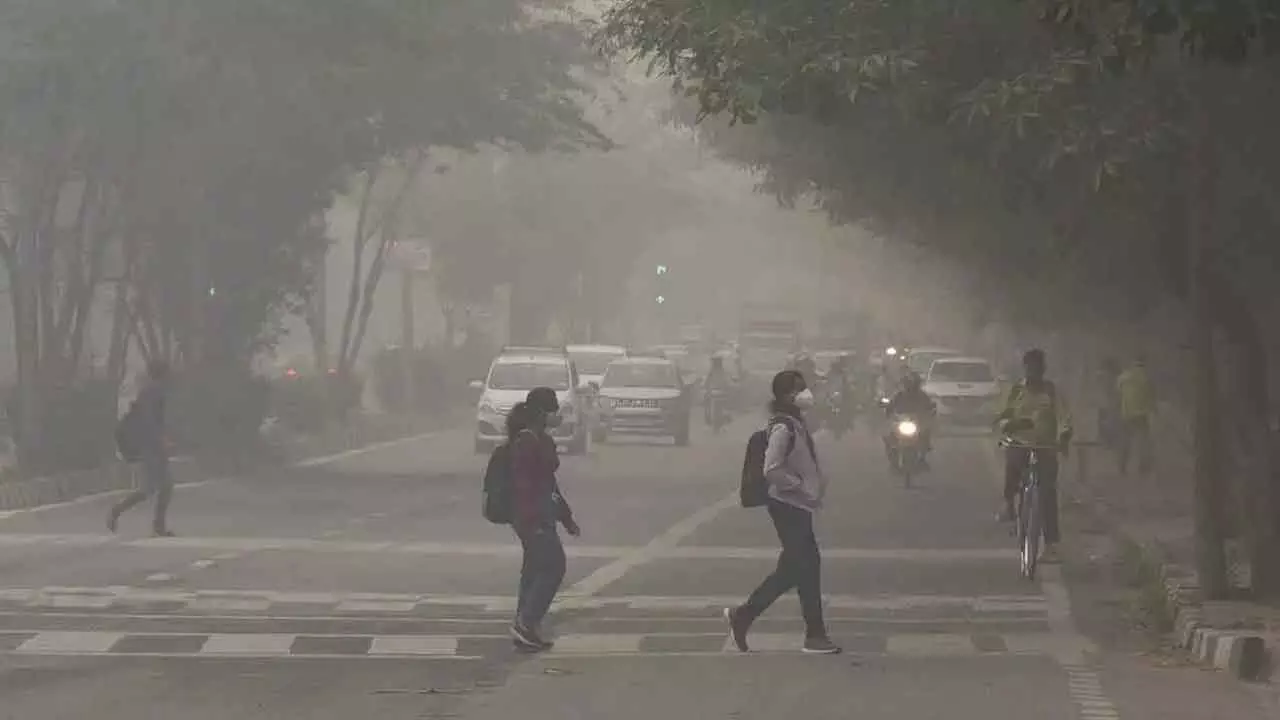Live
- Alampur MLA Vijayudu Urges Timely Completion of Nettempadu Project to Benefit Farmers
- Rustic women grow into successful entrepreneurs
- 2-day Masters Athletic Championship gets underway
- Convert crises into opportunities, Lokesh advises students
- Govt will recruit vacant posts on regular basis: Sridhar Babu
- Go after vendors selling Chinese manja: Asad to cops
- 52-year-old swims 150 km from Vizag to Kakinada
- We all have to protect & promote Telugu: Kishan
- ‘Organic Kuppam’ initiative tomorrow
- Religious leaders join hands to fight drug menace
Just In

The air quality in Delhi-NCR continues to deteriorate, posing severe health risks for the people living in the region. On Saturday, the Air Quality...
The air quality in Delhi-NCR continues to deteriorate, posing severe health risks for the people living in the region. On Saturday, the Air Quality Index (AQI) in the national Capital was recorded at 318, categorising it as 'very poor,' according to official data, while the air quality in Noida and Gurugram also continued to fall in the 'very poor' to 'severe' category.
This marks the sixth consecutive day that Delhi-NCR’s air quality has remained in the 'very poor' category, creating significant challenges for public health and daily life.
In Anand Vihar, one of the national Capital's most polluted areas, the AQI reached an alarming level of 505 around 8 A.M., placing it in the hazardous category. This is a stark indicator of the deteriorating environmental conditions.
The toxic air is not confined to Delhi alone, as neighboring cities are also grappling with dangerous pollution levels.
Meanwhile, in Uttar Pradesh on Saturday morning, Noida recorded an AQI of 267, Greater Noida 286, and Ghaziabad 250, while Haryana's Gurugram saw an AQI of 284, with most areas falling in the 'very poor' to 'severe' categories. The widespread pollution is making life increasingly difficult for residents across the region.
However, Noida’s Sector 125 recorded an AQI of 184, which falls in the 'moderate' to 'poor' range, offering a slightly better scenario compared to Delhi-NCR.
Adding to the worsening air quality, the temperature in Delhi has dropped significantly, intensifying the impact of pollution. On Friday morning, the temperature was recorded at 9.5 degrees Celsius, one degree below the season's normal, marking it the coldest day so far this winter.
To tackle the alarming pollution levels, the Supreme Court has directed that all Graded Response Action Plan (GRAP)-4 measures, except those related to schools, will remain in effect until the next hearing on December 2.
The court emphasised the need for strict enforcement and noted lapses in the implementation of GRAP-4 guidelines. It warned of action against officials responsible for such failures.
While allowing physical classes to continue, the court declined to ease restrictions under GRAP-3 or GRAP-2 until there was a consistent decrease in the AQI levels. It also instructed state governments to utilise the labour cess collected to support construction workers impacted by the ongoing construction ban.
Authorities have implemented several restrictions under GRAP-4, including a ban on the entry of non-essential trucks into Delhi, except those carrying essential goods or running on cleaner fuels such as LNG, CNG, BS-VI diesel, or electricity.
Construction activities for public infrastructure projects have also been suspended to curb dust pollution, a major contributor to the current crisis.

© 2024 Hyderabad Media House Limited/The Hans India. All rights reserved. Powered by hocalwire.com






